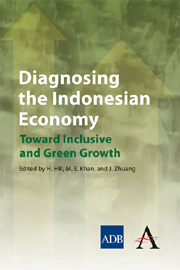Book contents
- Frontmatter
- Foreword
- Preface
- Author Profiles
- Abbreviations and Acronyms
- Contents
- 1 Introduction
- 2 Development Policies and Performance
- 3 Critical Constraints to Growth
- 4 Critical Constraints to Reducing Poverty and Inequality
- 5 Macroeconomic Management
- 6 Industrialization: Patterns, Issues, and Constraints
- 7 Infrastructure Development: Challenges and the Way Forward
- 8 Human Capital and Economic Development
- 9 Economic Growth, Employment Creation, and Poverty Alleviation
- 10 Poverty Reduction: The Track Record and Way Forward
- 11 Decentralization
- 12 Making Indonesia's Growth Green and Resilient
- Index
8 - Human Capital and Economic Development
Published online by Cambridge University Press: 05 May 2012
- Frontmatter
- Foreword
- Preface
- Author Profiles
- Abbreviations and Acronyms
- Contents
- 1 Introduction
- 2 Development Policies and Performance
- 3 Critical Constraints to Growth
- 4 Critical Constraints to Reducing Poverty and Inequality
- 5 Macroeconomic Management
- 6 Industrialization: Patterns, Issues, and Constraints
- 7 Infrastructure Development: Challenges and the Way Forward
- 8 Human Capital and Economic Development
- 9 Economic Growth, Employment Creation, and Poverty Alleviation
- 10 Poverty Reduction: The Track Record and Way Forward
- 11 Decentralization
- 12 Making Indonesia's Growth Green and Resilient
- Index
Summary
This chapter examines whether human capital, as evidenced by the availability of skilled workers, constrains growth in Indonesia. The chapter gives an overview of the skills level of the workforce using educational attainment as a proxy. Although the chapter notes an overall improvement in the skills level of young Indonesian workers (age 15–24) in recent years, Indonesia lags behind regional comparators. Though investment climate surveys do not detect human capital as a hindrance to business, labor market indicators suggest that a skills shortage has been affecting Indonesia's competitiveness in the region. The judgement as to whether the available human capital constitutes a constraint to growth depends on development strategies and blueprints for the growth of Indonesia's industry. With the launch of the master plan for six economic corridors, the country is aiming at a medium- and long-term growth scenario of moving up the production ladder from light industry and natural resources exploitation to a more sophisticated manufacturing production and knowledge-based economy. Under this scenario, human capital is likely to constitute a constraint to growth; therefore, improving the access to and quality of secondary and tertiary education could help achieve the growth scenario.
Education and Skills Level of the Workforce
Overall, the educational attainment of Indonesian workers has been improving remarkably in recent years (World Bank 2010). The share of workers with tertiary education and above has increased, with the trend most pronounced among women (Table 8.1).
- Type
- Chapter
- Information
- Diagnosing the Indonesian EconomyToward Inclusive and Green Growth, pp. 275 - 300Publisher: Anthem PressPrint publication year: 2012
- 4
- Cited by



